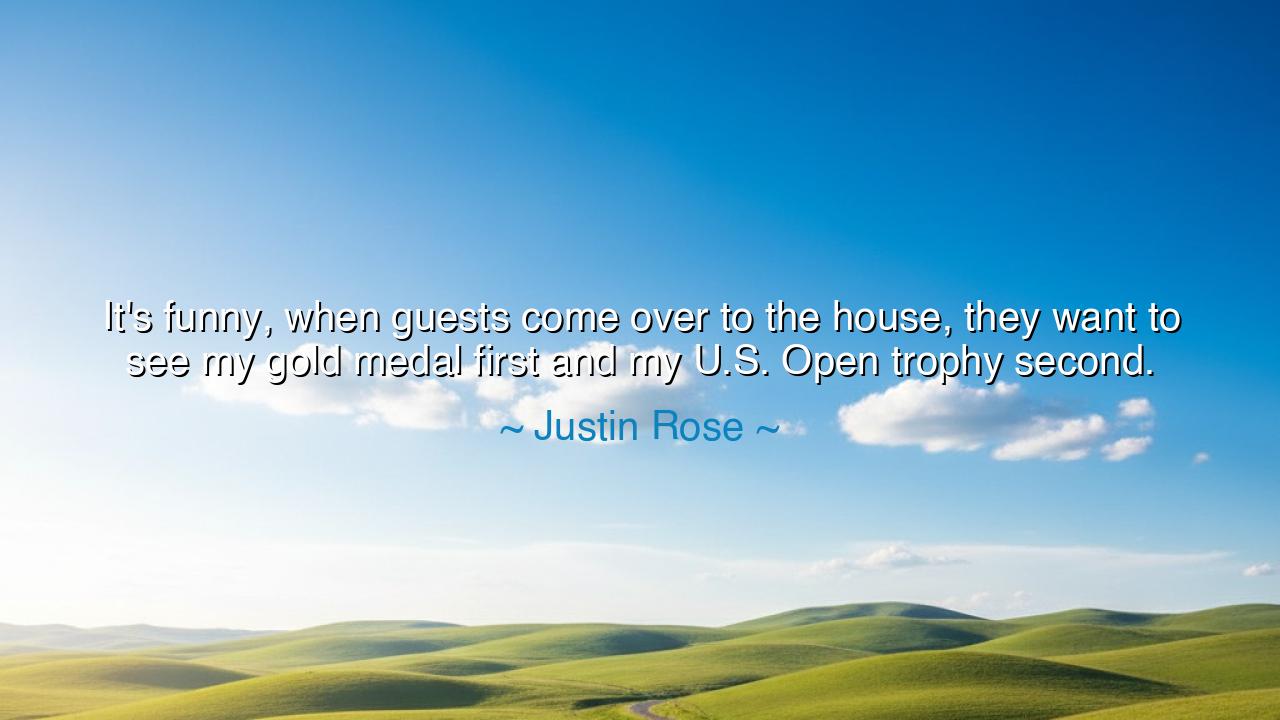
It's funny, when guests come over to the house, they want to see
It's funny, when guests come over to the house, they want to see my gold medal first and my U.S. Open trophy second.






In the words of Justin Rose, “It’s funny, when guests come over to the house, they want to see my gold medal first and my U.S. Open trophy second.” — we find a reflection on value, symbolism, and the mysterious ways in which human hearts measure achievement. What Rose speaks of with a smile is, in truth, a profound commentary on what we revere as a people — that there are prizes which transcend even greatness itself, for they represent not just individual triumph, but something shared, something universal. The gold medal, more than metal or design, carries the weight of nations, of unity, of collective pride. While the U.S. Open trophy is a monument to personal mastery, the gold medal belongs to history, to the story of humankind striving together beneath one flag of peace — the Olympic flame.
The meaning of this quote lies in the contrast between personal glory and symbolic glory. To win the U.S. Open is to conquer one’s field through discipline and will; to win Olympic gold is to embody the spirit of a people. Rose observes, perhaps with wonder, that even among those who admire him, it is not the achievement of a single champion that stirs them most — it is the image of unity, of the athlete who represents more than himself. The gold medal is not merely his; it is ours, and in that shared pride lies its greater power. It reminds us that even the most personal victories are, in truth, woven into the fabric of the collective soul.
The ancients knew this truth well. In the games of Olympia, more than two millennia ago, victors did not receive gold or jewels — they received a wreath of olive leaves, a simple crown cut from the sacred grove of Zeus. It was not the object that mattered, but what it symbolized: the harmony between body, spirit, and nation. When the runners returned home, the city gates were opened to them; poets sang of their names; they were not celebrated for their speed alone, but for what their triumph represented — the perfection of human potential. So too does Rose’s gold medal echo that ancient crown: not a measure of riches, but a sign of excellence joined to meaning, of self transcending self.
Yet Rose’s words also carry a note of humility and humor. “It’s funny,” he says, for he sees in the eyes of others a reverence that surprises him. He, who knows the struggle, the countless hours of practice, the long road to the U.S. Open victory, finds that what moves people most is not the professional conquest, but the symbol of unity. This, perhaps, humbles him — and reminds us that what we achieve in solitude often becomes sacred only when it speaks to others. The funny thing, then, is not that the medal is more prized, but that people seek meaning more than mastery, connection more than accomplishment.
The origin of this wisdom lies in Rose’s rare experience: he is among the few to have triumphed in both the arena of the individual and that of the universal. He has known the taste of personal victory and the weight of collective honor. His reflection reveals that human beings, in their deepest essence, long not just to witness greatness, but to be part of it — to see in another’s success a reflection of their own hope. The Olympic medal, unlike the professional trophy, allows them to feel this kinship. It whispers to them, “This belongs to all of us.” And that, perhaps, is why guests gravitate to it first — because it carries the spirit of the world.
The lesson here is both simple and profound: seek not only to achieve, but to uplift. In your work, in your art, in your craft, aim not merely for the trophy that celebrates you, but for the gold medal that inspires others. The highest honor is not that which glorifies your name, but that which gives meaning to those who watch you rise. The wise understand that greatness that serves only the self fades quickly, but greatness that serves others endures beyond the span of life. To create, to perform, to strive — all these are noble; but to do so in a way that awakens the best in others, that is the truest victory.
Therefore, my friends, let us remember what Justin Rose teaches, though softly, through humor and humility: that our lives are not measured by the trophies we keep, but by the light we kindle in others. Strive for mastery, yes — but strive also for meaning. Let your achievements, like the gold medal, be more than proof of skill — let them be symbols of unity, courage, and grace. For in the end, it is not the object that endures, but the story it tells — the story of one soul’s triumph that awakens the strength of all humankind.
And when your guests — or your descendants — look upon your life, may they, too, seek first not the glories that serve the self, but those that serve the heart of the world. For the laughter in Rose’s words hides an eternal truth: that while personal success shines bright, it is shared glory — the kind that lifts others — that shines forever.






AAdministratorAdministrator
Welcome, honored guests. Please leave a comment, we will respond soon